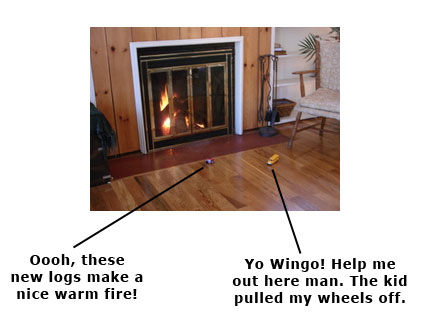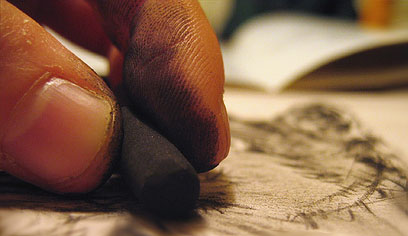Inside joke. Nothing to see here. Move along.


A scrapbook of thoughts on arts, culture and the Christian life.
Inside joke. Nothing to see here. Move along.


The function of gossip is, among other things, to permit people to enjoy danger vicariously, at no greater risk than that of being misled.
-Thomas Merton, Mystics and Zen Masters, p.258
On the necessity of good Christian schools:
I am overwhelmed at the thought of the tremendous weight of moral responsibility that Catholic parents accumulate upon their shoulders by not sending their children to Catholic schools. Those who are not of the Church have no understanding of this. They cannot be expected to. As far as they can see, all this insistence on Catholic schools is only a moneymaking device by which the Church is trying to increase its domination over the minds of men, and its own temporal prosperity. And of course most non-Catholics imagine that the Church is immensely rich, and that all Catholic institutions make money hand over fist, and that all the money is stored away somewhere to buy gold and silver dishes for the Pope and cigars for the College of Cardinals.
Is it any wonder that there can be no peace in a world where everything possible is done to guarantee that the youth of every nation will grow up absolutely without moral and religious discipline, and without the shadow of an interior life, or of that spirituality and charity and faith which alone can safeguard the treaties and agreements made by governments?
And Catholics, thousands of Catholics everywhere, have the consummate audacity to weep and complain because God does not hear their prayers for peace, when they have neglected not only His will, but the ordinary dictates of natural reason and prudence, and let their children grow up according to the standards of civilization of hyenas.– Thomas Merton, The Seven Story Mountain, p.50

And this recently from Bob Myers, a pastor and Boar’s Head Tavern fellow:
My congregation mostly thinks that sending their children to schools where Jesus is never considered and fairly often slammed, letting them immerse themselves in popular culture movies, music, etc. is basically neutral, and an hour or so of exposure to Jesus every couple weeks is potent enough to tip the balance in Jesus’ favor. Then, they are sometimes horrified, other times in denial, when their children start expressing unbelief and expressed resistance to their one hour every week or so. I want to tell them, “don’t come crying to me”… but then again, who do I want these parents to come crying to? (emphasis mine)
Both my wife and I had a mix a private and public schooling. I was also home-schooled for a time. We would like to send both our children to a private Christian school. There are several good ones here in town. Now I just have a couple of years to come up with the extra $600/month to pay for it. Gak.
Reading scripture, like praying or sharing in the sacraments, is one of the means by which the life of heaven and the life of earth interlock. (This is what older writers were referring to when they spoke of “the means of grace.” It isn’t that we can control God’s grace, but that there are, so to speak, places to go where God has promised to meet with his people, even if sometimes when we turn up it feels as though God has forgotten the date. More usually it’s the other way around.) We read scripture in order to hear God addressing us – us, here and now, today.
– N.T. Wright, Simply Christian, p.188

In the afterlife, our narrator speaks with the ghost of a gifted painter:
“When you painted on earth-at least in your earlier days-it was because you caught glimpses of Heaven in the earthly landscape. The success of your painting was that it enabled others to see the glimpses too. Light itself was your first love: you loved paint only as a means of telling about light.”
“Oh, that’s ages ago,” said the Ghost. “One grows out of that. Of course, you haven’t seen my later works. One becomes more and more interested in paint for its own sake.”
“One does, indeed. [He replied] I also have had to recover from that. It was all a snare. Ink and catgut and paint were necessary down there, but they are also dangerous stimulants. Every poet and musician and artist, but for Grace, is drawn away from love of the thing he tells, to love of the telling till, down in Deep Hell, they cannot be interested in God at all but only in what they say about Him.
– C.S. Lewis, The Great Divorce, p.78
This is a huge trap that artists of all kinds fall into. I have known MANY guitarists who fret over their gear to no end. They save up their money to buy that $4000 acoustic, or maybe even the Brazilian rosewood one. They’ve got the best strings, the best pedals, the TC Electronics reverb, no, scratch that, the Lexicon reverb is better. The best… oh, except they never practice. They haven’t learned a new tune in 3 years. Where was the energy back when they used to rock that pawn shop Harmony?
Apparently this is a classic snare for photographers as well. The discussion here is enlightening. Someone posted this quote:
“Amateurs worry about equipment, pros worry about money, masters worry about light.”
-Unknown
When I dabbled in music history at graduate school, we were given a 20-page scholarly journal article that concerned the opening trill to one of Beethoven’s violin sonatas. That’s it. The whole mountain of work and footnotes was on how to play the first note of the piece. And it was actually in someone’s job description to write this kind of over-analysis on a regular basis. What happened to making music? (I would link to the article here, but it’s behind a closed access library site.)
It’s so easy to get wrapped up in the details of art. Half the magazines on the rack feed of this weakness in us. It effects every discipline. Oh, does it ever effect theology! Check out the quote again:
Every poet and musician and artist, but for Grace, is drawn away from love of the thing he tells, to love of the telling till, down in Deep Hell, they cannot be interested in God at all but only in what they say about Him.
Lewis saw this as a twisting of love. A corruption of loving and finding joy in a piece of God’s creation. It is “bent” as he would say in some of his other works. It is our temptation. Shake it off and live. Go create something.

This is one of the richest passages in Thomas Merton’s New Seeds of Contemplation:
The prospect of this wilderness is something that so appalls most men that they refuse to enter upon its burning sands and travel among its rocks. They cannot believe that contemplation and sanctity are to be found in a desolation where there is no food and no shelter and no refreshment for their imagination and intellect and for the desires of the nature.
Convinced that perfection is to be measure by brilliant intuitions of God and fervent resolutions of a will on fire with love, persuaded that sanctity is a matter of sensible fervor and tangible results, they will have nothing to do with a contemplation that does not delight their reason and invest their minds and wills with consolations and sensible joy. They want to know where they are going and see what they are doing, and as soon as they enter into regions where their own activity becomes paralyzed and bears no visible fruit, they turn around and go back to the lush fields where they can be sure that they are doing something and getting somewhere.
And if they cannot achieve the results they desire with such intense anxiety, at least they convince themselves that they have made great progress if they have said many prayers, performed many mortifications, preached many sermons, read (and perhaps also written) many books and articles, paged through many books of meditations, acquired hundreds of new and different devotions and girdled the earth with pilgrimages. Not that all of these things are not good in themselves: but there are times in the life of a man when they can become an escape, an anodyne, a refuge from the responsibility of suffering in darkness and obscurity and helplessness, and allowing God to strip us of our false selves and make us into the new men that we are really meant to be. (from chapter 32).There is so much that could be said here. I’ve heard the “wilderness” mentioned frequently, in the Christian walk, but Merton hits the nail on the head here for what it really feels like. “No refreshment for the imagination or intellect and for desires of nature.” Spiritual depression. Drabness. Not necessarily the loss or questioning of the core of faith, but a loss of joy in living.
It’s easy to see what our next step usually is: Go back to stuff easy results. Foreign mission field sucks? Go back to your campus ministry job and reel those hoards of back-sliding freshman. Pastorate a drag? Time to go back to school for that PhD and get to work on that book idea. Following God, got a wife and kids, but dissatisfied with your day job? Looking for a “refuge from the responsibility of suffering in … obscurity.” Pick up Wild at Heart for a nice hot cup of open theism and go do something exciting (and most likely stupid). Screw the wilderness. Where’s can I buy my ticket out?
Now for the qualifications: Of course sometimes sticking with a bad situation isn’t the right thing to do. Both my wife and I have been too well trained in doing THAT when we probably SHOULD have moved on. Campus ministers are just fine. Thank God for the many helpful writings of Christian scholars who realized they weren’t cut out for being full-time shepherds. Etc. But THAT is the wilderness right there folks. The Lord has something to give us there. Perhaps we listen to him before running back to the green fields.
One doesn’t realise in early life that the price of freedom is loneliness. To be happy one must be tied.
-Collected Letters of C.S. Lewis, Volume III, p. 1169
My wife has been gone backpacking for four days now with no cell reception. The kids and I are doing fine really. I’m very glad that she gets back tonight.